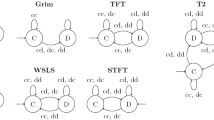Abstract
A central understanding in experimental economics is that subjects’ decisions in the lab are independent of history. We test whether this assumption of between-experiment independence is indeed justified. We analyze experiments with an allocation decision (like a dictator or ultimatum game) and find that participation in previous experiments tends to increase the amount subjects allocate to themselves. Hence, independence between experiments cannot be presumed if subjects participate repeatedly. The finding has implications for the interpretation of previous allocation decision results and deserves attention when running future experiments.
Similar content being viewed by others
References
Andreoni J. (1988) Why free ride? Strategies and learning in public goods experiments. Journal of Public Economics 37: 291–304
Ben-Ner A., Putterman L., Kong F., Magan D. (2004) Reciprocity in a two-part dictator game. Journal of Economic Behavior and Organization 53(3): 333–352
Bicchieri C., Xiao E. (2009) Do the right thing: But only if others do so. Journal of Behavioral Decision Making 22: 191–208
Blanco M., Engelmann D., Normann H. T. (2011) A within-subject analysis of other-regarding preferences. Games and Economic Behavior 72(2): 321–338
Bracht, J., & Regner, T. (2011). Moral emotions and partnership. Jena Economic Research Papers, 2011-028.
Brosig, J., Riechmann, T., & Weimann, J. (2007). Selfish in the end?: An investigation of consistency and stability of individual behavior. MPRA Paper, 2035.
Camerer C. (2003) Behavioral game theory: Experiments in strategic interaction. Cambridge University Press, Princeton, NJ
Casari M. L., Ham J. C., Kagel J. H. (2007) Selection bias, demographic effects, and ability effects in common value auction experiments. American Economic Review 97: 1278–1304
Chaudhuri A., Ali Khan S., Lakshmiratan A., Py A.-L., Shah L. (2003) Trust and trustworthiness in a sequential bargaining game. Journal of Behavioral Decision Making 16: 331–340
Cleave, B. L., Nikiforakis, N., & Slonim, R. (2010). Is there selection bias in laboratory experiments?. University of Sydney, Economic Working Paper Series, 2010-1.
Dickinson D. (1999) An experimental examination of labor supply and work intensities. Journal of Labor Economics 17(4): 638–670
Eckel C., Grossman P. (2000) Volunteers and pseudo-volunteers: The effect of recruitment method in dictator experiments. Experimental Economics 3: 107–120
Fischbacher U. (2007) z-Tree: Zurich toolbox for ready-made economic experiments. Experimental Economics 10(2): 171–178
Fischbacher U., Gächter S. (2010) Social preferences, beliefs, and the dynamics of free riding in public good experiments. American Economic Review 100(1): 541–556
Fischbacher U., Gächter S., Fehr E. (2001) Are people conditionally cooperative? Evidence from a public goods experiment. Economics Letters 71: 397–404
Greiner, B. (2004). An online recruitment system for economic experiments. In K. Kremer & V. Macho (Eds.), Forschung und wissenschaftliches Rechnen 2003. GWDG Bericht 63, Göttingen: Ges. für Wiss. Datenverarbeitung.
Guillen P., Veszteg R. F. (2012) On “lab rats”. Journal of Socio-Economics 41: 714–720
Gunnthorsdottir A., Rapoport A. (2006) Embedding social dilemmas in intergroup competition reduces free riding. Organizational Behavior and Human Decision Processes 101: 184–199
Güth, W. (1984). Egoismus und Altruismus—Eine spieltheoretische und experimentelle analyse. In Normengeleitetes Verhalten in den Sozialwissenschaften (Hrsg. H. Todt), Schriften des Vereins für Socialpolitik, N.F., 141, 35–58.
Güth W., Ploner M., Regner T. (2009) Determinants of in-group bias: Is group affiliation mediated by guilt-aversion?. Journal of Economic Psychology 30: 814–828
Harrison G., Johnson E., McInnes M. M., Rutström E. (2005) Risk aversion and incentive effects: Comment. American Economic Review 95/3: 897–901
Harrison G., Lau M., Rutström E. (2009) Risk attitudes, randomization to treatment, and self-selection into experiments. Journal of Economic Behavior and Organization 70/3: 498–507
Jamison J., Karlan D., Schechter L. (2008) To deceive or not to deceive: The effect of deception on behavior in future laboratory experiments. Journal of Economic Behavior and Organization 68: 477–488
Kahneman D., Knetsch J. L., Thaler R. H. (1986) Fairness as a constraint on profit seeking: Entitlements in the market. American Economic Review 76: 41–728
Klempt, C., & Pull, K. (2009). Generosity, greed and gambling: What difference does symmetric information in bargaining make? Jena Economic Research Papers, 2009-021.
Kugler T., Rapoport A., Pazy A. (2006) Public good provision in inter-team conflicts: Effects of asymmetry and profit-sharing rule. Journal of Behavioral Decision Making 23: 421–438
Mikula G. (1973) Gewinnaufteilungsverhalten in Dyaden bei variiertem Leistungsverhältnis. Zeitschrift für Sozialpsychologie 3: 126–133
Ortmann A., Hertwig R. (2002) The costs of deception: Evidence from psychology. Experimental Economics 5: 111–131
Regner, T., & Harth, N. S. (2010). Testing belief-dependant models Jena Economic Research Papers, 2010-072.
Selten R., Stöcker R. (1986) End behavior in sequences of finite prisoner’s dilemma supergames. Journal of Economic Behavior and Organization 7: 47–70
Shapiro E. G. (1975) Effects of future interaction in reward allocation in dyads: Equity or equality. Journal of Personality and Social Psychology 31: 873–880
Smith V. L. (2010) Theory and experiment: What are the questions?. Journal of Economic Behavior and Organization 73: 3–15
Vlaev I., Chater N. (2006) Game relativity: How context influences strategic decision making. Journal of Experimental Psychology: Learning, Memory, and Cognition 32(1): 131–149
Vlaev I., Chater N. (2007) Context effects in games: Local versus global sequential effects on choice in the prisoner’s dilemma game. Judgement and Decision Making 2(5): 380–389
Author information
Authors and Affiliations
Corresponding author
Rights and permissions
About this article
Cite this article
Matthey, A., Regner, T. On the independence of history: experience spill-overs between experiments. Theory Decis 75, 403–419 (2013). https://doi.org/10.1007/s11238-012-9346-z
Published:
Issue Date:
DOI: https://doi.org/10.1007/s11238-012-9346-z




